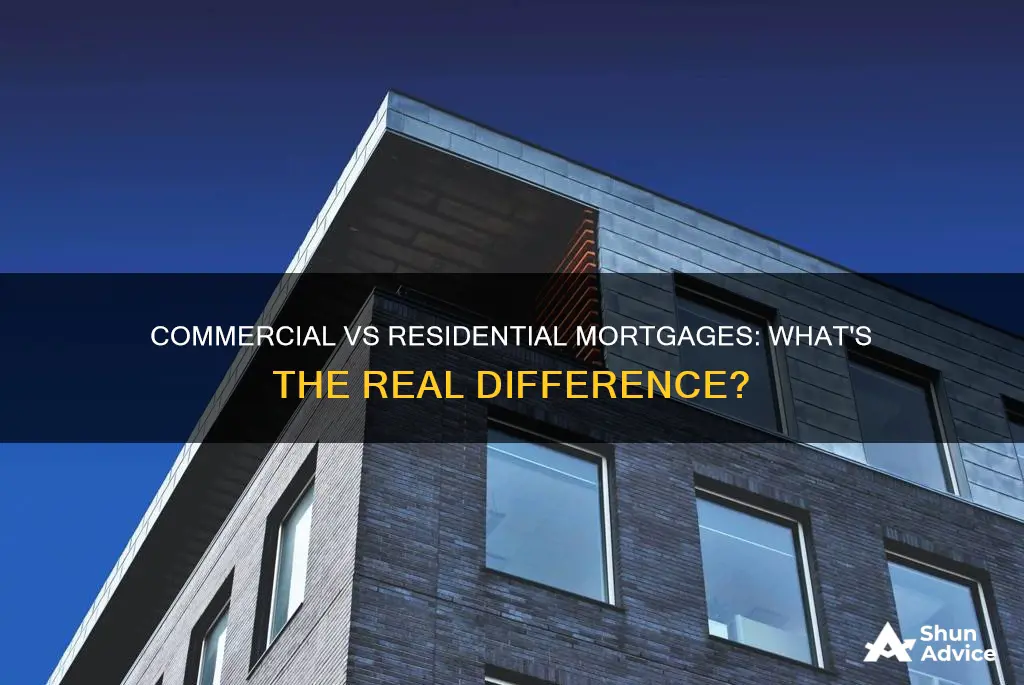
Commercial and residential mortgages differ in several ways. The type of mortgage you need depends on the purpose of the property. Residential mortgages are for properties that people will live in, such as houses or flats. Commercial mortgages, on the other hand, are for properties that businesses operate from, such as offices, shops, or warehouses. Commercial mortgages are generally considered riskier than residential mortgages because they focus on the rental income the property will make or the business income, rather than the borrower's financial standing. This means that commercial mortgages often have higher interest rates and require higher down payments.
What You'll Learn
- Risk and repayment: Commercial mortgages are riskier, with less flexibility and higher down payments
- Property type: Commercial mortgages are for business properties, residential for homes
- Source: Residential loans are from national lenders, commercial loans from local banks
- Interest rates: Commercial mortgages have higher, variable rates, residential have lower, fixed rates
- Purpose: Commercial mortgages are for business activities, residential for personal use

Risk and repayment: Commercial mortgages are riskier, with less flexibility and higher down payments
Commercial mortgages are generally considered riskier than residential mortgages. This is because, with a residential mortgage, lenders are primarily concerned with the borrower's financial standing and ability to make payments. They will, therefore, assess the borrower's income, credit score, and employment income against their spending to determine if they can afford the monthly payments.
However, with a commercial mortgage, the focus shifts to the rental income the property will generate or the business income if the borrower runs their own company from the premises. Lenders will assess the property's net operating income (NOI) to determine whether it exceeds the principal and interest payments. This means that, instead of knowing the borrower's annual salary, the lender has to predict whether the business will succeed and generate enough income to service the debt. This is not always easy to do and introduces an element of risk.
The higher risk associated with commercial mortgages results in less repayment flexibility. While residential mortgages typically have an amortization period of 30 years, commercial loans are often amortized over shorter periods, usually ten years. This lowers the risk for the lender as they receive greater monthly payments and are exposed to less risk overall. As a result, the monthly mortgage payments are significantly higher for commercial loans.
Additionally, down payments for commercial mortgages are typically higher than for residential mortgages. While a residential loan may require a down payment of 25%, a commercial loan could require a down payment of 20% or more, especially if the borrower does not have an existing relationship with the lender.
Mortgage Fraud: A Common and Costly Crime
You may want to see also

Property type: Commercial mortgages are for business properties, residential for homes
One of the most fundamental differences between commercial and residential mortgages is the type of property they are intended for. A residential mortgage is for purchasing a property that you will live in. These include houses or flats. The property types and usage are straightforward, allowing lenders to offer “pre-set” or standard residential mortgages. On the other hand, commercial mortgages are for buildings that businesses operate from. These include offices, warehouses, shops, restaurants, hotels, leisure centres, and garages. Commercial mortgages can also be used to buy land for commercial use.
Mixed-use properties, such as a pub with living accommodation, are eligible for a semi-commercial mortgage. Commercial mortgages can also be used for any type of rental property, including single-family homes. However, most investors use residential loans for smaller properties. This is because commercial loans are generally more expensive, with higher interest rates and shorter loan terms, resulting in significantly higher monthly mortgage payments.
The property type also determines the type of mortgage that a property qualifies for. For example, a residential apartment building with five units or more will typically be financed with a commercial mortgage.
The type of property also influences the lender's risk assessment. Residential mortgages are considered lower risk because borrowers are strongly motivated to keep up with mortgage payments to keep their homes. In contrast, commercial mortgages are riskier because the borrower's ability to make payments depends on the success of their business or the business tenants in the commercial property.
Notarizing Mortgage Documents: The California Notary's Role
You may want to see also

Source: Residential loans are from national lenders, commercial loans from local banks
When it comes to taking out a mortgage, there are several options available. The two most common types of mortgage loans are residential and commercial.
Residential mortgages are for purchasing a home, whereas commercial mortgages are for business purposes. Residential mortgages can be obtained from almost any large bank or national mortgage lender. In contrast, commercial mortgages tend to be sourced from local banks, particularly those with which the borrower has an existing relationship.
The type of property also determines the type of mortgage. A residential apartment building with five or more units will likely be financed with a commercial mortgage. Commercial property, such as a strip mall or office building, will also be financed with a commercial mortgage.
The amount of risk involved with a mortgage loan also affects repayment. For instance, the down payment for a residential mortgage can be negotiated with the lender, whereas a commercial mortgage down payment is typically higher and non-negotiable.
Monthly Mortgage: How Much Should You Be Spending?
You may want to see also

Interest rates: Commercial mortgages have higher, variable rates, residential have lower, fixed rates
Interest rates are a key differentiator between commercial and residential mortgages. Residential mortgages are generally associated with lower interest rates, which are fixed over the long term. This means that borrowers can lock in a rate, and their payments will remain the same throughout the duration of the loan, typically 30 years. The lower interest rates reflect the lower risk perceived by lenders. This is due to the borrower's strong motivation to keep up with mortgage payments to retain their home.
On the other hand, commercial mortgages tend to have higher interest rates, which are variable and tied to a standard index. As a result, the interest rate fluctuates, and payments can increase or decrease over time. The variable nature of commercial mortgage rates lowers the risk for the lender. If interest rates soar, the borrower's mortgage payments will also increase. Commercial mortgages are riskier for lenders because the borrower's ability to make payments is dependent on their business's success or the performance of business tenants in the property.
The higher interest rates of commercial mortgages contribute to significantly higher monthly payments. This is further exacerbated by the shorter amortization periods typically associated with these loans. While residential mortgages are commonly amortized over 30 years, commercial loans often have shorter terms, such as 20 years. The shorter amortization period reduces the risk for the lender and results in larger monthly payments.
It is important to note that interest rates for both types of mortgages can vary depending on the specific loan terms and conditions. For example, residential loans may have higher interest rates for shorter-term loans. Additionally, the interest rate for a commercial mortgage can be influenced by factors such as the borrower's relationship with the lender and the unique characteristics of the property.
Mortgage Brokers: Surviving the Bubble Burst and Beyond
You may want to see also

Purpose: Commercial mortgages are for business activities, residential for personal use
A key difference between commercial and residential mortgages is their purpose. A residential mortgage is for purchasing a property that you will live in. This includes houses or flats, and the property types and usage are generally straightforward. On the other hand, a commercial mortgage is for properties used for business activities. This could include offices, warehouses, shops, restaurants, hotels, leisure centres, and garages. Commercial mortgages can also be used to buy land for commercial use.
Residential mortgages are typically obtained from large banks or national mortgage lenders, whereas commercial loans tend to come from local banks. This means that for a commercial mortgage, it is important to establish a relationship with a local bank.
The type of property also determines the type of mortgage. A residential apartment building with five or more units is usually financed with a commercial mortgage. Commercial mortgages are also used for properties that are rented out to tenants, and the rental income can be used to offset mortgage payments.
The focus of the lender's assessment is also different for each type of mortgage. For residential mortgages, the emphasis is on the borrower's financial standing, including income, credit score, and employment income. With commercial mortgages, the focus shifts to the rental income the property will generate or the business income if the borrower is running their own company from the property. Lenders will also consider the cash flow the building will produce to qualify the mortgage for funding.
Mortgage Servicing Transfers: A Common Occurrence for Homeowners
You may want to see also
Frequently asked questions
Commercial mortgages are for properties that are used for business activities. This includes offices, warehouses, shops, restaurants, hotels, leisure centres, and garages. Commercial mortgages can also be used to buy land for commercial use.
Residential mortgages are for properties that people will live in, including houses or flats.
Residential loans can be obtained from almost any large bank or national mortgage lender. Commercial loans, on the other hand, are more likely to come from local banks.
Commercial mortgages are generally considered riskier than residential mortgages. Lenders assess the borrower's ability to repay the loan differently for each type of mortgage. For residential mortgages, the emphasis is on the borrower's financial standing, including their income and credit score. For commercial mortgages, the focus shifts towards the rental income the property will generate or the business income if the borrower plans to run their own company from the property.







